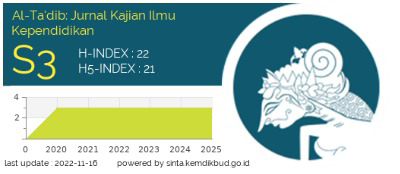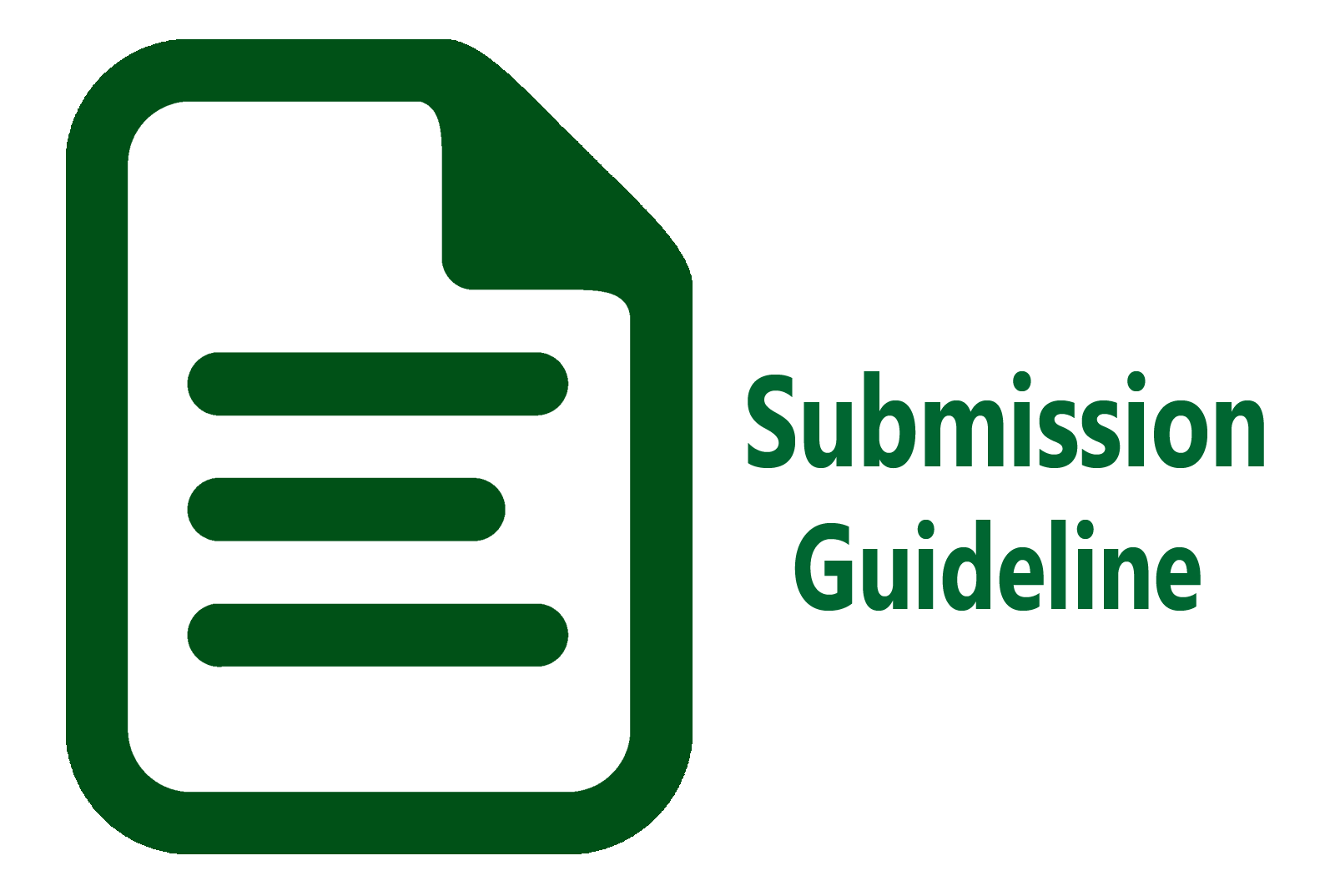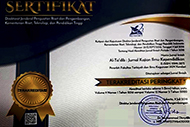Pengaruh Implementasi Kurikulum Outcome Based Education (OBE) terhadap Kemampuan Problem Solving Mahasiswa
Abstract
This study examines the effect of implementing the Outcome Based Education (OBE) curriculum on the problem-solving abilities of Management Study Program students at the Faculty of Economics and Business, a university in Padang, Indonesia, focusing on the Information and Computer Technology course. The subjects were 60 students, and a correlational quantitative approach was used. Data analysis included descriptive analysis, normality test, linearity test, and linear regression test. Results showed normally distributed and linear data. The F-test yielded a value of 15.918 with a significance level of 0.000<0.005, indicating a significant influence of the OBE curriculum (X) on problem-solving ability (Y). The R Squared value of 0.215 indicates that the OBE curriculum accounts for 21.5% of the variance in students' problem-solving abilities, excluding other factors.
Keywords: Ability; curriculum; information and computer technology; outcome based education; problem solving
Full Text:
PDFReferences
Akir, O., Eng, T. H., & Malie, S. (2012). Teaching and learning enhancement through outcome-based education structure and technology e-learning support. Procedia - Social and Behavioral Sciences, 62, 87–92. Doi : 10.1016/j.sbspro.2012.09.015
Arofah, E. F. (2016). Evaluasi kurikulum pendidikan. Jurnal Tawadhu, 15(2), 1–23.
Daryanes, F., Darmadi, D., Fikri, K., Sayuti, I., Rusandi, M. A., & Situmorang, D. D. B. (2023). The development of articulate storyline interactive learning media based on case methods to train student’s problem-solving ability. Heliyon, 9(4), e15082. Doi: 10.1016/j.heliyon.2023.e15082
Eng, T. H., Akir, O., & Malie, S. (2012). Implementation of outcome-based education incorporating technology innovation. Procedia - Social and Behavioral Sciences, 62, 649–655. Doi: 10.1016/j.sbspro.2012.09.108
Fajar, D. A., Fitria, L., Yunus, Y., Studi, P., & Konseling, B. (2023). Hubungan antara kematangan emosi dengan agresi pada remaja di SMK Negeri Padang. DIAJAR: Jurnal Pendidikan dan Pembelajaran, 2(4), 472–481. Doi: 10.54259/diajar.v2i4.1990
Fiandi, A. (2023). Konsep outcome based education (OBE) pada lembaga pendidikan. Jurnal Penelitian Pendidikan Indonesia (JPPI), 1(1), 1–23.
Fransisca, M., Yunus, Y., & Saputri, R. P. (2021). Workshop pembuatan media ajar berbasis android bagi mahasiswa Praktek Lapangan Kependidikan (PLK) Kota Padang. UNRI Conference Series: Community Engagement, 3, 78–83. Doi: 10.31258/unricsce.3.78-83
Hidayatulloh, R., Suyono, S., & Azizah, U. (2020). Analisis keterampilan pemecahan masalah siswa SMA pada topik Laju Reaksi. JPPS (Jurnal Penelitian Pendidikan Sains), 10(1), 1899. Doi: 10.26740/jpps.v10n1.p1899-1909
Huang, S.-Y., Kuo, Y.-H., & Chen, H.-C. (2020). Applying digital escape rooms infused with science teaching in elementary school: Learning performance, learning motivation, and problem-solving ability. Thinking Skills and Creativity, 37, 100681. Doi: 10.1016/j.tsc.2020.100681
Huda, N. (2017). Manajemen pengembangan kurikulum. Al-Tanzim: Jurnal Manajemen Pendidikan Islam, 1(2), 52–75. Doi: 10.33650/al-tanzim.v1i2.113
Ilham, M., & Desinatalia, R. (2022). Pemanfaatan media gambar animasi berbasis PowerPoint untuk meningkatkan kemampuan membaca permulaan siswa sekolah dasar. Al-Ta’dib: Jurnal Kajian Ilmu Kependidikan, 15(2), 100-114. Doi: 10.31332/atdbwv15i2.5350
Katawazai, R. (2021). Implementing outcome-based education and student-centered learning in Afghan public universities: The current practices and challenges. Heliyon, 7(5), e07076. Doi: 10.1016/j.heliyon.2021.e07076
Khan, M. S. H., Salele, N., Hasan, M., & Abdou, B. O. (2023). Factors affecting student readiness towards OBE implementation in engineering education: Evidence from a developing country. Heliyon, 9(10), e20905. Doi: 10.1016/j.heliyon.2023.e20905
Khanna, R., & Mehrotra, D. (2019). The roadmap for quality improvement from traditional through competency based (CBE) towards outcome based education (OBE) in dentistry. Journal of Oral Biology and Craniofacial Research, 9(2), 139–142. Doi: 10.1016/j.jobcr.2019.02.004
Mufanti, R., Carter, D., & England, N. (2024). Outcomes-based education in Indonesian higher education: Reporting on the understanding, challenges, and support available to teachers. Social Sciences & Humanities Open, 9, 100873. Doi: 10.1016/j.ssaho.2024.100873
Muzakir, M. I., & Susanto. (2023). Implementasi kurikulum outcome based education (OBE) dalam sistem pendidikan tinggi di era revolusi industri 4.0. Edukasiana: Journal of Islamic Education, 2(1), 118–139. Doi: 10.61159/edukasiana.v2i1.86
Nurfaidah, S., Patih, T., & Aini, N. (2018). Deskripsi kemampuan statistika deskriptif mahasiswa Tadris Bahasa Inggris IAIN Kendari. Al-Ta’dib: Jurnal Kajian Ilmu Kependidikan, 11(2), 55–72.
Rathy, G. A., Sivasankar, P, S., & Gnanasambandhan, T. G. (2020). Developing a knowledge structure using outcome based education in power electronics engineering. Procedia Computer Science, 172, 1026–1032. Doi: 10.1016/j.procs.2020.05.150
Rohaili, J., Setiadi, D., & Kusmiyati, K. (2021). Pengaruh penerapan bahan ajar model inkuiri terbimbing terintegrasi kearifan lokal berbasis outcome based education (OBE) melalui penggunaan media online terhadap literasi sains. Jurnal Pijar MIPA, 16(2), 157–162. Doi: 10.29303/jpm.v16i2.2379
Sasipraba, T., Bantha Navas, R. K., Nandhitha, N. M., Prakash, S., Jayaprabakar, J., Pushpakala, S. P., Subbiah, G., Kavipriya, P., Ravi, T., & Arunkumar, G. (2020). Assessment tools and rubrics for evaluating the capstone projects in outcome based education. Procedia Computer Science, 172, 296–301. Doi: 10.1016/j.procs.2020.05.047
Sefriani, R., Yunus, Y., Ambiyar, Syah, N., & Fadhilah. (2023). Correlation of social media addiction to academic achievement in e-learning. Indonesian Journal of Computer Science, 12(2), 284–301.
Siregar, S. H., Yunus, Y., & Juwita, A. I. (2022). Uji pratikalitas pembuatan dan perancangan media interaktif. DIAJAR: Jurnal Pendidikan dan Pembelajaran, 1(4), 424–430. Doi: 10.54259/diajar.v1i4.1105
Todd, A., & Mason, M. (2005). Enhancing learning in South African schools: Strategies beyond outcomes-based education. International Journal of Educational Development, 25(3), 221–235. Doi: 10.1016/j.ijedudev.2004.08.003
Wardani, S. S., Susanti, R. D., & Taufik, M. (2022). Implementasi pendekatan computational thinking melalui game Jungle Adventure terhadap kemampuan problem solving. SJME (Supremum Journal of Mathematics Education), 6(1), 1–13. Doi: 10.35706/sjme.v6i1.5430
Yasmin, M., & Yasmeen, A. (2021). Viability of outcome-based education in teaching English as second language to chemical engineering learners. Education for Chemical Engineers, 36, 100–106. Doi: 10.1016/j.ece.2021.04.005
DOI: http://dx.doi.org/10.31332/atdbwv17i1.8807
Refbacks
- There are currently no refbacks.
Copyright (c) 2024 Yuliawati Yunus, Hasan Maksum, Waskito Waskito

This work is licensed under a Creative Commons Attribution-NonCommercial-ShareAlike 4.0 International License.
| Indexing: |










